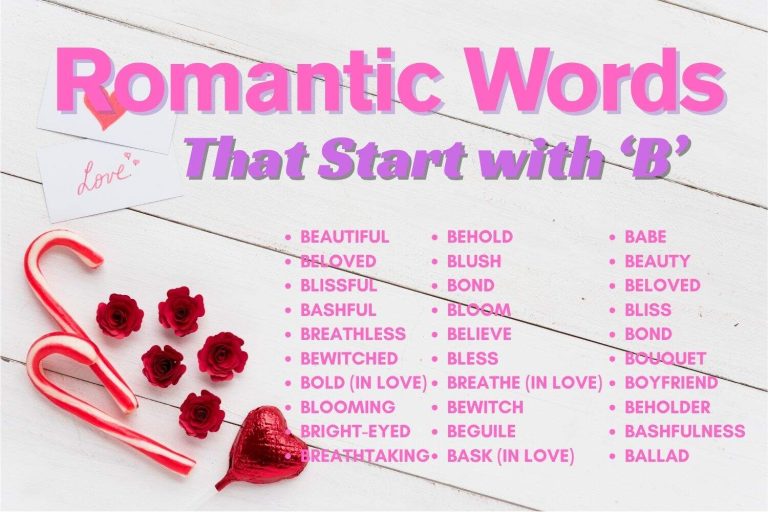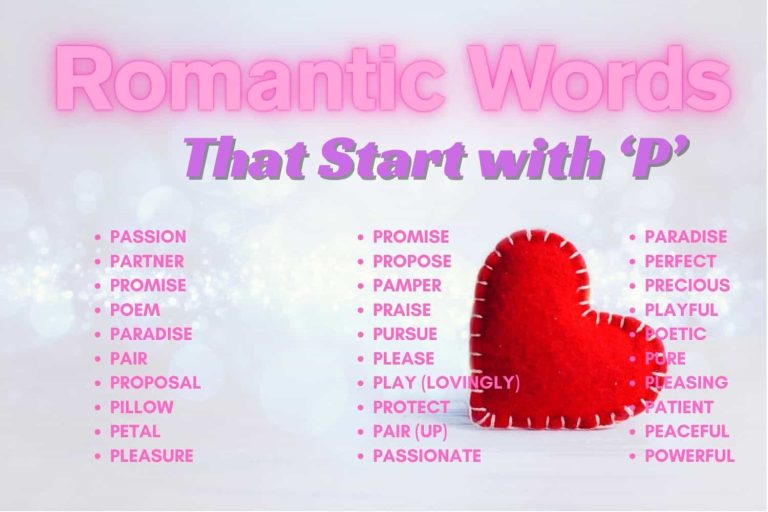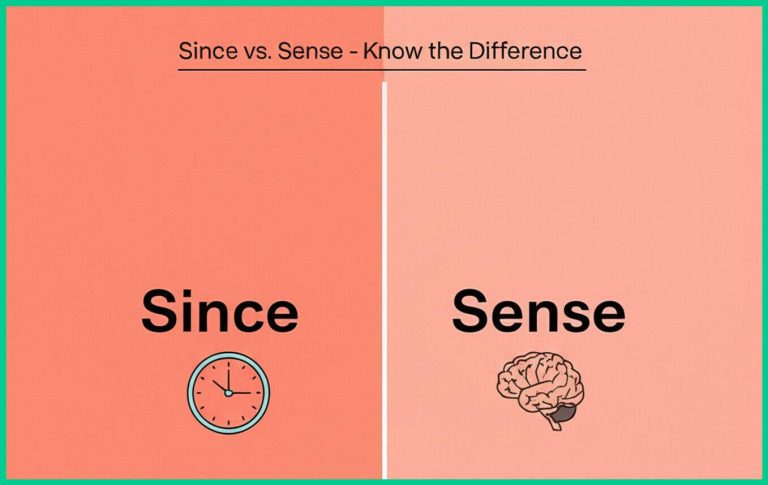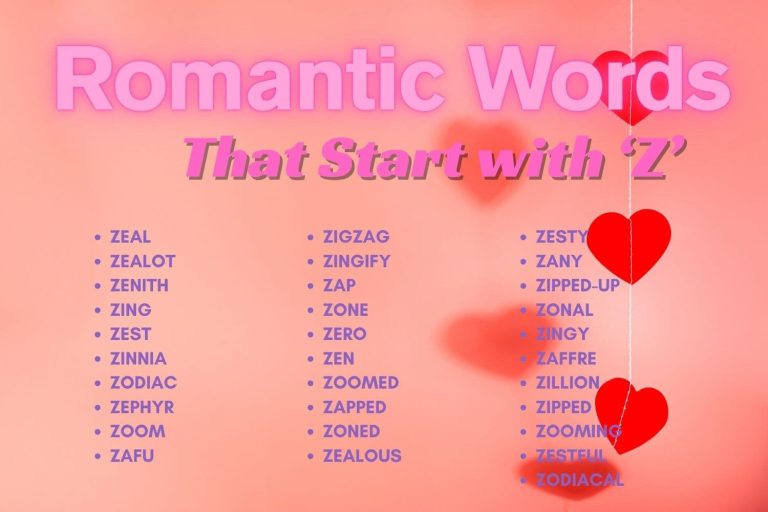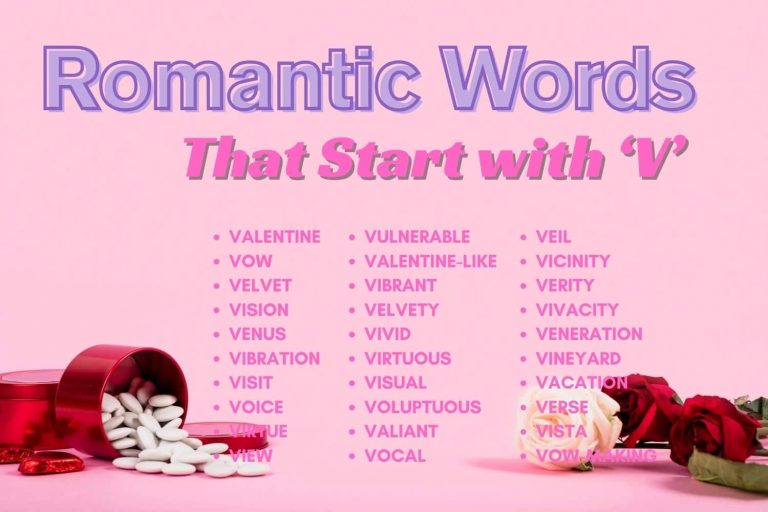50+ Romantic Words Starting with “O” to Express Love and Affection
The English language is rich with words that evoke feelings of love, affection, and deep connection. While many focus on common romantic vocabulary, exploring less conventional terms can add depth and nuance to our expressions of love.
Romantic language is more than just saying “I love you.” It’s about the subtle nuances, the carefully chosen words that capture the depth and complexity of our emotions. Words starting with “O” often carry a sense of wonder, intensity, and heartfelt sincerity.
Exploring these words can help you articulate your feelings more effectively. This article provides a comprehensive guide to understanding and using romantic words that begin with “O,” enhancing your ability to express love and affection eloquently and gracefully.
List of Examples of Romantic Words Starting with “O”
Romantic words starting with “O” can be categorized based on their grammatical function. Each category plays a distinct role in expressing romantic sentiments.
The following sections provide examples of romantic words starting with “O,” categorized by their grammatical function. These examples illustrate how these words can be used in various romantic contexts.
Nouns Examples
Nouns that begin with “O” can add a unique layer of depth and sentiment to your romantic vocabulary. Here are some examples of how these nouns can be used to convey affection, admiration, and love:
| Romantic Noun (Starting with O) | Example Sentence |
|---|---|
| Oblation | Her presence was an oblation of peace and joy in his chaotic world. |
| Oasis | In her arms, he found an oasis of calm amidst the storms of life. |
| Opulence | The opulence of their love was evident in every shared glance and tender touch. |
| Overture | His shy smile was the overture to a romance she had long dreamed of. |
| Oath | They sealed their love with an oath of eternal devotion. |
| Offering | His heart was an offering of unwavering love, presented without hesitation. |
| Omen | Their meeting felt like a positive omen, a sign of a beautiful future together. |
| Oneness | They found oneness in their shared dreams and mutual respect. |
| Optimism | Her optimism was a beacon, guiding them through difficult times. |
| Ornament | He saw her as the most precious ornament in his life. |
| Original | Her unique perspective made her an original, captivating his heart completely. |
| Outpouring | The outpouring of love she received on her birthday overwhelmed her with joy. |
| Outlook | Their shared outlook on life created a strong bond between them. |
| Object | She was the object of his deepest affection and admiration. |
| Occasion | Every moment spent together was a special occasion to be cherished. |
| Office | She held the office of his confidante, a role she cherished deeply. |
| Offshoot | Their love was an offshoot of a deep friendship, blossoming into something beautiful. |
| Olive branch | He offered an olive branch after their disagreement, seeking reconciliation. |
| Opportunity | Meeting her felt like an opportunity to experience true happiness. |
| Order | She brought order to his chaotic life, a sense of peace he had never known. |
| Origin | She was the origin of his happiness and inspiration. |
| Outcome | The outcome of their relationship was a deep and lasting love. |
| Outset | From the outset, he knew their love was something special. |
Adjectives Examples
Adjectives that start with “O” can add a layer of specificity and emotional depth to your descriptions of love, romance, and affection. Here are some examples of how to use these adjectives in romantic contexts:
| Romantic Adjective (Starting with O) | Example Sentence |
|---|---|
| Optimistic | He was optimistic about their future together, always seeing the best in their relationship. |
| Outstanding | Her kindness and compassion made her an outstanding partner. |
| Overjoyed | He was overjoyed when she accepted his proposal. |
| Open-hearted | Her open-hearted nature made it easy for him to fall in love with her. |
| Original | Her original sense of humor always kept him laughing. |
| Otherworldly | Her beauty was otherworldly, captivating him from the moment they met. |
| Obliging | He was always obliging, eager to help her in any way he could. |
| Observant | His observant nature allowed him to notice the small things that made her happy. |
| Official | They made their relationship official with a beautiful wedding ceremony. |
| Omnipotent | He felt omnipotent when he was with her, capable of overcoming any challenge. |
| Onerous | No task felt too onerous when he knew he was doing it for her. |
| Ongoing | Their ongoing love story was filled with joy, laughter, and unwavering support. |
| Only | She was the only one who truly understood him. |
| Opportune | The timing was opportune for them to finally confess their feelings. |
| Opulent | Their wedding was an opulent affair, reflecting the grandeur of their love. |
| Orderly | He found comfort in her orderly mind and calming presence. |
| Organic | Their love felt organic, growing naturally and effortlessly over time. |
| Ornamental | She was an ornamental addition to his life, bringing beauty and grace to everything she touched. |
| Outlandish | Her outlandish ideas always kept their relationship exciting and unpredictable. |
| Outspoken | Her outspoken support for him made him feel incredibly loved and valued. |
| Outstretched | He met her with outstretched arms, ready to embrace her with love. |
| Overwhelming | The love he felt for her was overwhelming, filling his heart completely. |
| Overarching | Their overarching commitment to each other was the foundation of their strong relationship. |
Verbs Examples
Verbs that start with “O” are less common in romantic contexts, but they can still add a unique touch when used thoughtfully. These verbs often convey actions or states of being that are associated with love, devotion, or affection.
| Romantic Verb (Starting with O) | Example Sentence |
|---|---|
| Obey | He would obey her every wish, driven by his deep love and desire to please her. (Used in the context of devoted service, not subservience.) |
| Offer | He would offer her his unwavering support, no matter what challenges they faced. |
| Observe | He would observe her every move, captivated by her grace and beauty. |
| Outshine | Her beauty would outshine all others in his eyes, forever holding his gaze. |
| Overcome | Together, they would overcome any obstacle, their love serving as their strength. |
| Overlook | He would overlook her flaws, seeing only her beautiful heart and soul. |
| Outlast | He hoped their love would outlast the test of time, remaining strong and true forever. |
| Outpour | He would outpour his love and affection onto her, showering her with tenderness. |
| Own | He would own his mistakes and weaknesses, striving always to be the best partner he could be. |
| Ordain | Fate seemed to ordain their meeting, bringing them together in a serendipitous moment. |
| Organize | He would organize his life around her, making her his top priority. |
| Orient | He would orient his actions toward her happiness, always considering her needs and desires. |
| Originate | His happiness seemed to originate from her presence in his life. |
| Overwhelm | Her love would overwhelm him with joy and gratitude. |
Adverbs Examples
Adverbs that begin with “O” can add subtle but meaningful nuances to your expressions of love and affection. They can modify verbs, adjectives, or other adverbs to provide a deeper understanding of the intensity or manner in which actions are performed or feelings are experienced.
| Romantic Adverb (Starting with O) | Example Sentence |
|---|---|
| Openly | He openly declared his love for her in front of all their friends and family. |
| Obligingly | She obligingly agreed to dance with him, even though she was tired. |
| Objectively | Objectively speaking, they were the perfect match, complementing each other in every way. |
| Officially | They were officially engaged after a romantic proposal on a moonlit beach. |
| Often | He often brought her flowers, a small gesture that meant the world to her. |
| Only | She was the only one he wanted to spend the rest of his life with. |
| Optimistically | They looked optimistically toward their future together, filled with hope and excitement. |
| Ordinally | He loved her ordinally, meaning he loved her more and more with each passing day. |
| Originally | Originally, they were just friends, but their connection soon blossomed into something more. |
| Outwardly | Outwardly, he seemed calm, but inwardly, he was bursting with love for her. |
| Outstandingly | She performed outstandingly at her recital, making him incredibly proud. |
| Over | He fell over heels in love with her charming personality and infectious laugh. |
| Overwhelmingly | He was overwhelmingly grateful for her love and support. |
Usage Rules
Using romantic words effectively requires an understanding of their nuances and appropriate contexts. Here are some key usage rules to keep in mind:
Context Matters: The same word can have different connotations depending on the situation. Consider the formality of the setting and the nature of your relationship when choosing your words.
Authenticity is Key: Use words that genuinely reflect your feelings. Forced or insincere language can undermine your message.
Consider Your Audience: Tailor your language to the individual you’re addressing. What resonates with one person may not resonate with another.
Balance and Moderation: While romantic language can be powerful, avoid excessive or overly dramatic expressions. A subtle touch is often more effective.
Be Mindful of Cultural Differences: Romantic expressions can vary across cultures. Be aware of any cultural sensitivities that may apply.
Common Mistakes
Even experienced language users can make mistakes when using romantic words. Here are some common errors to avoid:
Misusing Formal Language: Using overly formal language in an intimate setting can sound stiff and unnatural.
Incorrect Word Choice: Choosing a word that doesn’t accurately reflect your intended meaning can lead to confusion or misinterpretation.
Overusing Clichés: Relying too heavily on clichés can make your expressions sound unoriginal and insincere.
Ignoring Context: Failing to consider the context can result in using words that are inappropriate or out of place.
Grammatical Errors: Grammatical errors can detract from the impact of your message. Pay attention to proper grammar and syntax.
Example 1: Incorrect: “I obey you in all things, my love.” Correct: “I am devoted to you and cherish your wishes, my love.” (The word “obey” can imply subservience, which is not always a romantic sentiment.)
Example 2: Incorrect: “Her optimism is very good.” Correct: “Her optimism is a beacon of hope in my life.” (The first sentence is grammatically correct but lacks emotional depth.)
Practice Exercises
Test your understanding of romantic words starting with “O” with these practice exercises.
Exercise 1: Fill in the Blanks
Fill in the blanks with the most appropriate romantic word starting with “O.”
| Question | Answer |
|---|---|
| 1. Her smile was an ________ of sunshine on a cloudy day. | oasis |
| 2. He felt ________ when she said “yes” to his proposal. | overjoyed |
| 3. They sealed their love with an ________ of eternal devotion. | oath |
| 4. He ________ declared his love for her in front of everyone. | openly |
| 5. She was the ________ one he wanted to spend his life with. | only |
| 6. He would ________ his love and affection, showering her with tenderness. | outpour |
| 7. Their love felt completely ________, growing naturally over time. | organic |
| 8. She held the ________ of his confidante, a role she cherished deeply. | office |
| 9. He was ________ about their future, always seeing the best in their relationship. | optimistic |
| 10. They looked ________ towards their future together, filled with hope and excitement. | optimistically |
Exercise 2: Sentence Construction
Create a romantic sentence using each of the following words starting with “O.”
| Word | Example Sentence |
|---|---|
| Oblation | Her love was an oblation, freely given and deeply cherished. |
| Optimistic | He remained optimistic that their love would conquer all obstacles. |
| Offer | He wanted to offer her a lifetime of happiness and devotion. |
| Openly | She openly expressed her gratitude for his unwavering support. |
| Overwhelm | The depth of his love threatened to overwhelm her with emotion. |
| Original | He found her to be an original in a world of copies. |
| Oath | They made an oath to love each other through thick and thin. |
| Oasis | Her presence was an oasis of peace in his hectic life. |
| Overjoyed | She was overjoyed by his thoughtful and romantic gesture. |
| Oblige | He was happy to oblige her with anything she needed. |
Exercise 3: Error Correction
Identify and correct the errors in the following sentences.
| Incorrect Sentence | Corrected Sentence |
|---|---|
| 1. He obey her always because he loves her. | He is devoted to her and cherishes her wishes because he loves her. |
| 2. She was very optimism about their future. | She was very optimistic about their future. |
| 3. He openly told her he loved her to all people. | He openly told everyone that he loved her. |
| 4. Her is the only one for me. | She is the only one for me. |
| 5. He outbursted his love to her. | He poured out his love to her. |
| 6. The love overcomed him. | The love overwhelmed him. |
| 7. He offer her a ring. | He offered her a ring. |
| 8. Their love organic growed. | Their love organically grew. |
| 9. She has office of his heart. | She holds the office of his heart. |
| 10. He is optimist always. | He is always optimistic. |
FAQ
Here are some frequently asked questions about romantic words starting with “O.”
Q1: Are there many romantic words that start with “O”?
A1: While not as abundant as words starting with other letters, there are still a significant number of romantic words starting with “O” that can enrich your vocabulary and add depth to your expressions of love. These words often carry unique connotations and can be used to convey a wide range of emotions.
Q2: How can I effectively use these words in my writing or speech?
A2: To use these words effectively, consider the context, your audience, and the specific emotion you want to convey. Choose words that genuinely reflect your feelings and avoid overuse or clichés.
Practice incorporating these words into your writing and speech to become more comfortable and confident in their use.
Q3: What is the difference between “oblation” and “offering”?
A3: Both “oblation” and “offering” refer to something presented as a gift or sacrifice. “Oblation” often carries a stronger connotation of religious or spiritual significance, while “offering” is a more general term.
In a romantic context, “oblation” might suggest a deeper, more profound commitment, while “offering” could refer to a more tangible gift or gesture.
Q4: Is it appropriate to use formal words like “obey” in romantic contexts?
A4: The appropriateness of using formal words like “obey” depends heavily on the context and the nature of the relationship. While “obey” can imply devoted service or yielding to a loved one’s wishes, it can also suggest subservience, which may not be a desirable sentiment in a romantic relationship.
Use such words with caution and consider the potential implications.
Q5: How can I avoid sounding cliché when using romantic words?
A5: To avoid sounding cliché, focus on expressing your feelings in a genuine and personal way. Avoid relying too heavily on overused phrases or sentiments.
Instead, try to find unique and creative ways to express your love and affection. Incorporating specific details and personal anecdotes can also help make your expressions more authentic and meaningful.
Q6: What are some common mistakes to avoid when using romantic words starting with “O”?
A6: Some common mistakes include misusing formal language in intimate settings, choosing words that don’t accurately reflect your intended meaning, overusing clichés, ignoring context, and making grammatical errors. Pay attention to these potential pitfalls to ensure that your expressions of love are clear, effective, and sincere.
Q7: How can I expand my romantic vocabulary beyond words starting with “O”?
A7: To expand your romantic vocabulary, read widely, explore poetry and literature, and pay attention to the language used in romantic films and music. Look for words that resonate with you and that accurately reflect your feelings.
Practice using these words in your writing and speech to become more comfortable and confident in their use. Additionally, consider studying etymology to understand the origins and nuances of different words.
Q8: Can the meaning of a romantic word starting with ‘O’ change over time?
A8: Yes, like all words, the meanings and connotations of romantic words starting with “O” can evolve over time. This evolution is influenced by cultural shifts, societal changes, and the way these words are used in literature, media, and everyday conversation.
Staying aware of these changes can help you use these words more effectively and avoid potential misinterpretations.
Conclusion
Exploring romantic words starting with “O” offers a unique opportunity to enhance your ability to express love and affection. By understanding their meanings, usage rules, and potential pitfalls, you can craft more meaningful and memorable expressions of your feelings.
Remember to choose words that genuinely reflect your emotions, consider the context and your audience, and strive for authenticity in your communication. With practice and attention to detail, you can master the art of using romantic language to create deeper connections and strengthen your relationships.
Embrace the power of language to express the beauty and complexity of love.

